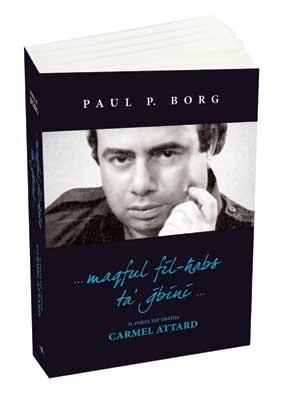Poet Carmel Attard died in 1994 at the age of 51. He was known for his protest poetry and the deep insight shown in his reflections. He published two books of lyrics, Taħt qillet ix-Xemx in 1972 and Lampara in 1980. A selection of his unpublished work is being published by Horizons together with a biography of the poet written by his friend the author Paul P. Borg. The book is called ...maqful fil-ħabs ta' ġbini..., (literally, locked in the prison of my mind) aptly called by the biographer using a phrase from the poet's own lyrics to indicate the life-long anxiety that afflicted the poet, imprisoning him as it were in his thoughts emanating from mental suffering.
Being close friends with Attard since early childhood all through the poet's turbulent life, Mr Borg is able to trace and recount incredible episodes in life's ups and downs that created inevitably profound poetry exposing the human soul to the suffereing stemming from the illusions that life can bring about. Mr Borg recounts where their two lives met and is able to depict the brave endeavours of his gentle friend in his attempts to be accepted by a society that would not shed easily its stigma. Those were days when society and even some institutions, perhaps unkowingly even castigated those needing special care or those who were brave enough to take decisons in their intimate personal life, especially where love was concerned.

These characteristics existing not so many years ago and which society has not yet freed itself completely from, were challenged by Attard. His life and his poetry show glaring truths: a Christian society is not necessarily a kind, or charitable society that abolishes stigma easily. Christian traditions and education do not necessarily result in a society that easily accepts diversity and minorities. It is on the other hand, these same avandgardist stances that paradoxically render Attard's poetry so beautiful, expressive and unique in the Maltese literature. Indeed, it is likely that the local scene has yet to establish the distinctive niche Attard deserves in literature. The biographer insists that there is nothing that separates poetry from Attard; poetry was not only his real companion, but his own self. His very life was one whole poem.
Mr Borg shows that his peaceful poet friend was contemplative and pensive in nature, and he reduced every single breathing episode as a poetic discourse with the self of his restless existence. The author still cherishes the endless discussions the two friends used to have during their frequent encounters over many years of friendship, the endless efforts they mutually exerted as friends to help each other during troubled patches along the way, sometimes in the company of their other friend, poet Mario F. Bezzina, who was also a neighbour. The writer recalls painful situations he and Attard found themselves immersed in due to society's own disbelief of maladies of its own creation. Even today, modern society has not yet come completely to terms with an individual's freedom especially where matters of sexual orientation and natural feelings are concerned; society is still not completely in consonance with the natural needs of the marginalised few, let alone two or three decades ago.
In this biography, Mr Borg describes scenes that take him and his friend and his inseparable poetry from the childhood years of a troubled eight-year-old, all through a never-ending adolescence immersed in feelings of guilt and contrition, on right or wrong. Borg proceeds to uncover the human drama that unfolds at San Anton's gardens, or in the sitting room, or in the streets of Birkirkara beneath the weak light of a corner street lamp on cold December/Januray nights or at Buleben in Qawra during the blazing July/August days or at Ħal Balzan, or even at Mount Carmel Hospital, or at the place of work in a congested office and the foul smell of the smoke from the magna tad-dawl... the devilish turbine that continues to thwirl and whine in the brain even in the silence of a black solitary night demanding an abrupt termination of life itself.
Mr Borg moves on to follow his friend's constant obsession in quest of an ever-deluding love. He contends that Carmel Attard and his unique verse show how inevitable it is for true poetry as a living art to become a sincere reflection of life itself, and of the very society from which it springs.
The writer hopes that this volume will serve as the starting point that triggers more studies and investigations by the students of Literature, Psychology, Sociology and related areas to show this local poet's participation in the human universal quest for survival.